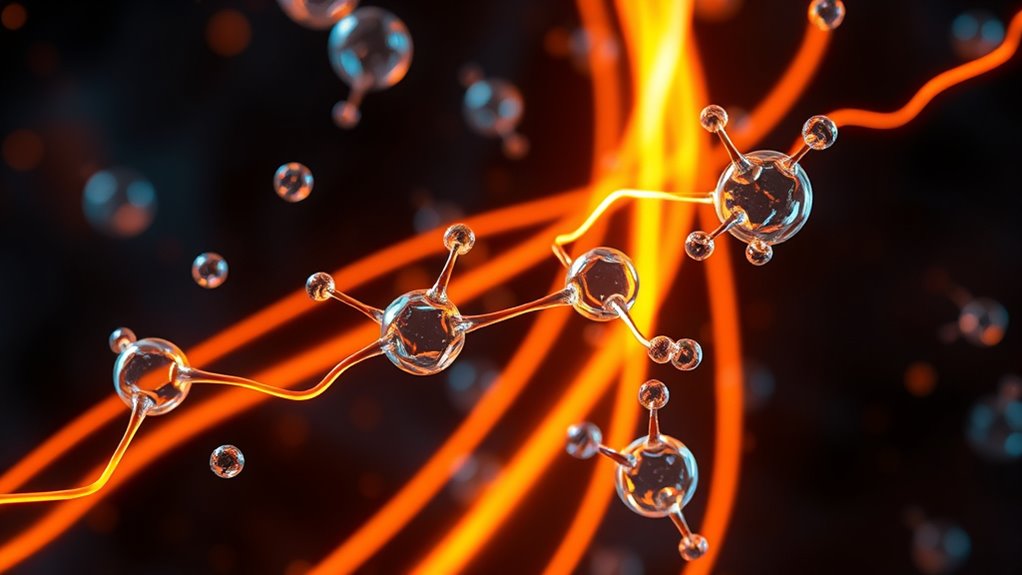When you follow the keto diet, your body shifts from burning carbs to fats for energy, leading to a process called ketosis. Your liver converts fatty acids into ketone bodies—acetone, acetoacetate, and beta-hydroxybutyrate—which serve as a steady fuel source for your brain and muscles. This metabolic change takes days to weeks, improving fat access and energy stability. Keep exploring to understand how your body adapts and benefits from this powerful fuel shift.
Key Takeaways
- The keto diet shifts the body from carbohydrate to fat as its primary fuel source, triggering ketone production.
- During ketosis, the liver converts fatty acids into ketone bodies like beta-hydroxybutyrate for energy.
- Metabolic adaptation over days to weeks enhances the body’s ability to efficiently utilize fats and ketones.
- Ketones provide a steady energy supply to the brain and muscles, reducing reliance on fluctuating blood glucose.
- This metabolic shift increases fat burning, improves energy stability, and supports weight loss.

Ketosis is a metabolic state your body enters when it switches from using carbohydrates as its primary fuel to burning fat. When you drastically reduce your carb intake, your body begins to look for alternative energy sources. This process triggers ketone production, where your liver converts fatty acids into ketone bodies—acetone, acetoacetate, and beta-hydroxybutyrate—that can be used by your brain and muscles for energy. This shift isn’t automatic; it requires your body to undergo metabolic adaptation, gradually becoming more efficient at utilizing fats and ketones instead of glucose. This adaptation is supported by Metabolic flexibility, which allows your body to efficiently switch between fuel sources based on availability and demand. As your body becomes more adaptable, you may notice improved energy levels and better tolerance to varying dietary conditions.
As you maintain a ketogenic diet, your body becomes better at producing ketones. This is a key part of the metabolic adaptation process, where your metabolism transitions from a glucose-dependent system to one that prioritizes fat oxidation. You’ll notice that, after a few days of low-carb eating, your energy feels more stable, and you experience fewer sugar crashes. This is because your brain adapts to ketones as a steady fuel source, reducing your reliance on fluctuating blood glucose levels. The increase in ketone production also signals that your body is burning stored fat, which is why ketosis is often associated with fat loss. Fat burning is enhanced as hormonal changes support this metabolic shift, further promoting fat oxidation and energy stability.
During this adaptation phase, your body becomes more efficient at mobilizing and oxidizing fatty acids, which means your fat stores are more accessible for energy. This process doesn’t happen overnight; it can take several days to a couple of weeks for your body to fully adapt. During this time, your liver ramps up ketone production, and your tissues learn to utilize these molecules effectively. Additionally, hormonal changes support this shift in fuel utilization, further promoting fat burning and energy stability. The role of ketone bodies in providing an alternative energy source becomes more prominent as your body adapts. As a result, your overall metabolism shifts, favoring fat as the primary energy source. This metabolic flexibility is what makes ketosis sustainable and effective for weight management and other health benefits. Moreover, understanding how enzymes involved in ketone synthesis function can deepen your comprehension of this metabolic process.
Frequently Asked Questions
How Long Does It Take to Enter Ketosis?
You can typically enter ketosis within 2 to 4 days of starting the keto diet, but it varies based on your metabolic adaptation and activity level. When your body shifts to fat oxidation for energy, it takes time to adapt. Staying consistent with low carbs speeds up this process, helping you reach ketosis sooner. Hydration and exercise can also support faster metabolic adaptation and quicker entry into ketosis.
Can You Stay in Ketosis Permanently?
Many believe you can stay in ketosis permanently, but metabolic adaptation makes this challenging. Your body adjusts to sustained ketosis, which can affect ketogenic markers like blood ketone levels. While some maintain ketosis long-term, it’s not always sustainable or healthy for everyone. Continuous ketosis may require strict adherence, and your body might shift back to glucose use over time. Consult a healthcare professional to determine if long-term ketosis fits your health goals.
Does Ketosis Cause Muscle Loss?
You might wonder if ketosis causes muscle loss. It’s unlikely if you focus on muscle preservation by maintaining adequate protein intake. When you’re in ketosis, your body uses fat for fuel, but consuming enough protein helps protect your muscles. So, with proper nutrition, ketosis doesn’t have to lead to muscle loss. Just guarantee you’re eating enough protein and strength training regularly to support muscle health.
Are There Any Long-Term Health Risks?
It’s no coincidence that long-term keto use might lead to health risks. You could experience metabolic adaptation, which makes weight loss harder over time, or nutrient deficiencies if your diet isn’t well-balanced. While some studies suggest potential risks like kidney issues or bone health concerns, these are often linked to improper implementation. Staying informed and consulting healthcare providers helps minimize these risks, ensuring you maintain a healthy, sustainable keto lifestyle.
How Can I Tell if I’M in Ketosis?
You can tell if you’re in ketosis by monitoring ketone detection through urine strips, blood tests, or breath analyzers. Common ketosis symptoms include increased energy, mental clarity, reduced hunger, and bad breath. If you notice these signs and your tests show elevated ketone levels, you’re likely in ketosis. Keep track regularly to confirm, especially if you’re adjusting your diet or aiming for specific health goals.
Conclusion
Now that you understand how ketosis works, you can see it’s like steering uncharted waters with a trusty compass—your body shifting fuel sources for ideal energy. Just remember, even in this modern age, the principles of metabolic adaptation echo ancient survival skills. Embrace the science, but tread carefully, for like a wise old sailor, you must respect the journey’s unpredictable nature. With knowledge as your vessel, you’re ready to sail confidently into your keto adventure.









